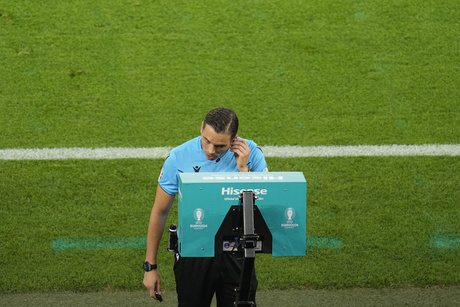Cutting-edge technology on show at Euro 2024 is changing the face of football

From smart-enabled match balls and artificial intelligence to cryogenic recovery chambers, football is being transformed by the cutting-edge technology available to players, coaches and officials.
That much has been evident at Euro 2024, where advancements in areas such as equipment and sports science have been deployed on and off the field, designed to improve the game, the fan experience and player welfare.
Not all of it is a hit with everyone.
For instance, there are still complaints about VAR decisions — just as there were about decisions in the days before VAR was introduced.
Regardless, the world's most popular sport continues to be impacted by rapidly-developing technologies in the wider world.
Right calls
VAR decisions have, in large part, seemed to be a smoother process here than seen, for instance, in the Premier League last season. UEFA is deploying semi-automated offside technology, along with AI and Adidas' connected ball technology to speed up the review process and improve accuracy.
Ten cameras are installed in each of the host stadiums, which UEFA says track 29 different points of the body on every player. Combined with the official tournament ball, which has a sensor to help detect every touch, and AI, the decision-making process is supposed to be quicker and more conclusive than before.
Perhaps too conclusive for some. Belgium's Romelu Lukaku had three goals ruled out in his opening two games — two for offside and one for a handball from teammate Loïs Openda in the build up, which was detected by the ball's sensor.
Goal-line technology has ended debate over marginal calls in terms of whether the ball has crossed the line. There are seven cameras in each goal and a signal is sent to the referee's watch, which vibrates if the ball has crossed the line. UEFA says results are sent within one second of the action.
The ball
While the Adidas Fussballliebe, which is the official match ball of the Euros, is assisting with offside calls, it also seems to be a hit with players.
It's made from recycled polyester and other materials including corn fibers, sugar cane and wood pulp, and players have spoken of the speed and distance it generates.
That would appear to be evident judging by the number of stunning long-range goals scored during the group stage, such as Arda Guler's curling effort from around 20 meters in Turkey's 3-1 win against Georgia.
Wearables
Coaches are trying to find an edge wherever they can.
England's players have been spotted wearing smart rings.
"The idea is it helps monitor your sleep, which is the biggest factor in terms of recovery," England manager Gareth Southgate said. "So no matter what things are invented in the world, the best things to aid recovery are sleep and nutrition. We're not checking on the players but it allows them to monitor their own recovery."
Cristiano Ronaldo is an ambassador for a band which monitors sleep and biometric data such cardiovascular and muscular load.
Tracking vests have long-been used to measure distances covered by players.
Southgate is also wearing a smart watch which retails at $6,500, has its own tracking capabilities and also provides score alerts during the tournament.
One unexpected wearable is Kylian Mbappe's custom-made protective mask — the France striker needed it after suffering a broken nose in his opening game.
Treatment
Teams have a suite of recovery devices to help players cope with the congested tournament schedule.
Spain's base camp in Donaueschingen has a hyperbaric oxygen chamber, a cryogenic chamber and a phototherapy bed to help speed muscular recovery after practice or a game.
A hyperbaric oxygen chamber is used to breathe in 100% pure oxygen. Cryogenic treatment involves the use of cold temperatures, while phototherapy uses light.
"This works wonders after the intense games we have here at the Euros. Anything that can give us an edge we are going to take advantage of," Spain forward Nico Williams said on Instagram.
England captain Harry Kane has made use of air compression boots, which massage players' legs and increase circulation.
Downtime
Boredom can be one of the biggest issues to deal with during a long tournament, with players spending time away from home and their family and friends.
They can often be seen arriving at stadiums with their state-of-the-art, noise-cancelling headphones. Not every player uses the latest technology, however — England's Cole Palmer was seen wearing corded ear buds.
Personal devices are a must, with smart phones, pads and gaming devices usually close at hand. Germany's Kai Havertz was seen carrying a popular video game console as he stepped off the team bus.
Germany's base in Herzogenaurach also has a giant cinema screen by an outdoor pool.
All the devices aren't purely for fun or distraction. For Spain's 16-year-old winger Lamine Yamal, his spare time can be taken up with catching up with homework on his pad.



